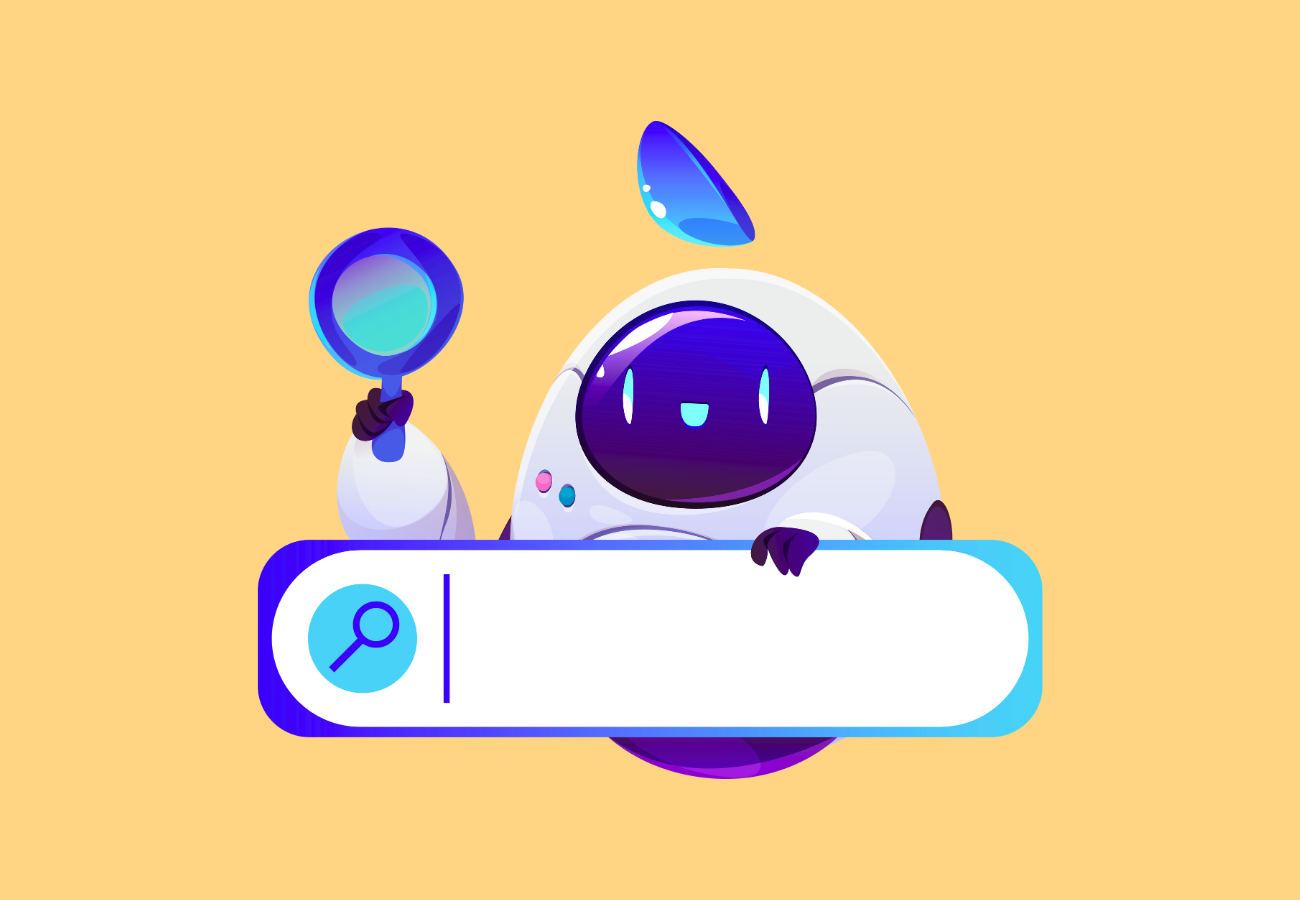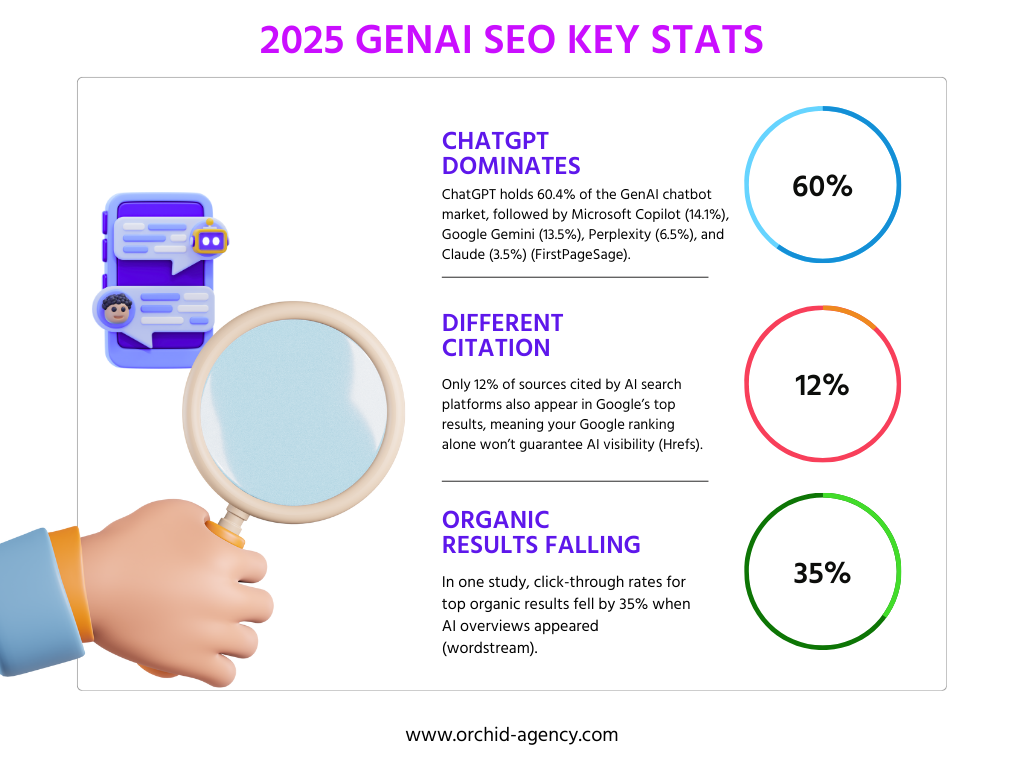AI SEO: How to Update Your Content for ChatGPT Search

Search has entered a new era. Instead of scanning through Google’s results pages, people are asking conversational AI platforms like ChatGPT to get immediate, summarized answers.
This isn’t just convenience; it’s a fundamental shift in how information is consumed and why businesses need to start thinking about AI SEO as part of their core strategy to reach B2B buyers.
The numbers don’t lie. AI-sourced website sessions jumped 527% from early 2024 to early 2025, climbing from 17,076 to 107,100 across 19 GA4 properties.
Meanwhile, ChatGPT now processes 2.5 billion prompts daily, more than double from just eight months earlier. AI platforms may represent less than 1% of website visits compared to ~11% from traditional search, but by 2028, Gartner predicts ~50% of all search activity could shift to AI assistants—cutting organic traffic from Google in half.
What is AI SEO?
AI SEO is about ensuring your content isn’t just visible to humans but also understood and cited by AI-powered search assistants. Instead of competing for a top-10 spot on Google, you aim to be the trusted answer inside a conversational AI response.
That requires a shift in priorities:
AI tools lean heavily on recency. In fact, AI platforms favor sources that are 25.7% fresher than those ranked in Google’s organic results. If your content is outdated or vague, AI will overlook it.
AI content optimization means giving these platforms exactly what they want: clarity, credibility, and freshness.
How does AI SEO differ from traditional SEO?
While traditional SEO optimizes for ranking in search results, AI SEO focuses on being selected as a reliable source by generative models. That subtle difference changes the playbook entirely.
- Different citation behavior: Only 12% of sources cited by AI search platforms also appear in Google’s top results, meaning your Google ranking alone won’t guarantee AI visibility.
- Platform-driven priorities: As of August 2025, ChatGPT holds 60.4% of the generative AI chatbot market, followed by Microsoft Copilot (14.1%), Google Gemini (13.5%), Perplexity (6.5%), and Claude (3.5%). Optimizing only for Google leaves you blind to where millions of queries are shifting.
- Impact on organic traffic: Google’s AI Overviews have already caused 15–64% declines in organic traffic, depending on industry and query type—proof that AI is reshaping visibility.
- Bias toward freshness: AI platforms favor content that is, on average, 25.7% fresher than sources highlighted in Google search.

How do GenAI tools surface content?
GenAI tools aren’t just rolling the dice; they are curating information. They reward content that is timely, structured, and trustworthy. If your content doesn’t check those boxes, it won’t cut.
- Recency: Updated content earns priority.
- Authority: Data-driven and cited sources win credibility.
- Clarity: Straightforward, conversational writing is easier for AI to extract.
- Structure: Lists, FAQs, and strong formatting improve visibility.
Google still drives 379 times more visits to news websites than ChatGPT. That gap won’t close overnight, but it’s shrinking, and preparation is key.
How do I update content for ChatGPT search?
Refreshing your content now ensures it’s ready for ChatGPT SEO and future AI tools. Updating isn’t about chasing trends; it’s about protecting your digital footprint for the long term.
With the right adjustments, your content can thrive in both Google and ChatGPT search.
- Regularly update content: Outdated posts quickly lose visibility in AI results, so review and refresh your top-performing content every 6–12 months to keep them prioritized.
- Answer questions directly: Use FAQs and conversational headings that map to how buyers actually phrase their questions so AI platforms can surface your answers.
- Use clear formatting: Structure content with H2/H3 headings, bullet points, and FAQs to make insights scannable and easy for both people and AI systems to extract.
- Include credible data: Back up your claims with authoritative sources and fresh statistics since AI tends to favor trustworthy, verifiable information.
- Write for humans first: Focus on natural explanations and strategic keyword placement instead of keyword stuffing, which damages readability and credibility.
- Optimize across platforms: Extend your SEO approach beyond ChatGPT by also optimizing for Gemini, Copilot, and other emerging AI assistants.
- Stay on top of trends: Continuously track how AI tools and SEO best practices evolve so you can adapt your strategy before competitors do.
Start small.
With Gartner forecasting 50% of searches shifting to AI by 2028, ignoring AI search could cut your traffic in half. Don’t get overwhelmed; you can start small by optimizing a handful of your most important pages for AI SEO. Add conversational Q&A sections and keep an eye on how AI platforms surface your content to identify gaps and opportunities for improvement.
Keep in mind that search is being rewritten. While AI still accounts for a small slice of traffic today, its growth is explosive. Billions of prompts, shrinking overlaps with Google, and declining organic clicks all point to one truth: AI SEO is the future of visibility


